491 Results
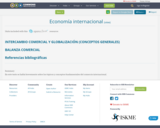
En este texto se habla brevemente sobre los tópicos y conceptos fundamentales del comercio internacional.
- Subject:
- Business and Communication
- Economics
- Finance
- Social Science
- Material Type:
- Data Set
- Date Added:
- 09/23/2018
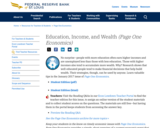
No surprise—people with more education often earn higher incomes and are unemployed less than those with less education. Those with higher incomes also tend to accumulate more wealth. Why? Research shows that well-educated people tend to make financial decisions that help build wealth. Their strategies, though, can be used by anyone.
- Subject:
- Business and Communication
- Economics
- Finance
- Social Science
- Material Type:
- Lesson
- Reading
- Provider:
- Federal Reserve Bank of St. Louis
- Provider Set:
- Page One Economics
- Author:
- Scott A. Wolla
- Date Added:
- 09/11/2019
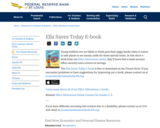
Young children are not likely to think past their piggy banks when it comes to safe places to set money aside for those special items. In this short e-book from our Ella's Adventures series, they'll learn that a bank account offers security and a return on savings.
- Subject:
- Business and Communication
- Economics
- Finance
- Social Science
- Material Type:
- Lesson
- Reading
- Provider:
- Federal Reserve Bank of St. Louis
- Provider Set:
- Economic Lowdown Lessons
- Date Added:
- 09/11/2019
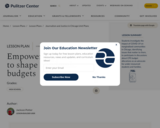
The Chicago Public Schools typically operate with a $7.7 billion annual budget that now has over $2.3 billion in federal stimulus funding to address inequities, COVID-related impacts and gaping needs. That is a 30% increase beyond a typical CPS budget that normally has very little room to address historic inequities. However, there is no participatory budget process in place to allow students or CPS families to have their voices heard in the process. This unit plan is designed to change that and provide opportunities for students to directly influence the budget process at this critical moment when historic inequities have widened.
- Subject:
- Business and Communication
- Finance
- Material Type:
- Lesson Plan
- Provider:
- Pulitzer Center
- Author:
- Jackson Potter
- Date Added:
- 08/23/2021
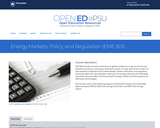
EME 801 provides a broad introduction to global markets for crude oil and refined petroleum products, natural gas, and electric power. A major goal of the course is to help students understand how market design, market institutions, and regulatory structures affect firm-level decision-making in the energy industries and ultimately, how these decisions affect the functioning of energy markets and the prospects for alternative technologies.
- Subject:
- Applied Science
- Business and Communication
- Career and Technical Education
- Economics
- Environmental Science
- Environmental Studies
- Finance
- Social Science
- Material Type:
- Full Course
- Provider:
- Penn State College of Earth and Mineral Sciences
- Author:
- Seth Blumsack
- Date Added:
- 10/07/2019
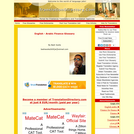
This is a lengthy glossary of highly technical terms focused on finance. Its contents include words dealing with taxes, inheritance, interest rates, retirement plans, and every other aspect of personal finance, as well as many generic legal terms that are also used in the finance world.
- Subject:
- Arts and Humanities
- Business and Communication
- Finance
- Languages
- Material Type:
- Reading
- Provider:
- Translation Directory
- Author:
- Badr Assila
- Date Added:
- 10/14/2013

Are you ready to BUILD? Get ready to launch an engaging community-building Challenge."More than 90% of the students and teachers who have completed our challenge said they would recommend it to others."Watch your students embrace entrepreneurial thinking as they create real-world solutions to today’s challenges. BUILD's Thriving Communities Design Challenge invites youth to use Design Thinking to answer: How might we build powerful, thriving communities where everyone enjoys safety, wellness, and economic freedom.
- Subject:
- Business and Communication
- Career and Technical Education
- Communication
- Finance
- Graphic Design
- Management
- Marketing
- Mathematics
- Social Work
- Speaking and Listening
- Material Type:
- Interactive
- Lesson Plan
- Module
- Student Guide
- Teaching/Learning Strategy
- Unit of Study
- Author:
- Brian Costanzo
- Date Added:
- 01/11/2022
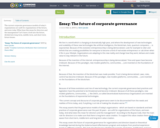
The current corporate governance models of today’s organizations are unfit for organizations of the future, and even today. What does this mean for directors and the management? Let’s have a look into the future, divided into long-term, middle-term, and short-term future lenses.
- Subject:
- Applied Science
- Business and Communication
- Career and Technical Education
- Communication
- Computer Science
- Economics
- Education
- Electronic Technology
- Finance
- General Law
- Higher Education
- Information Science
- Law
- Management
- Social Science
- Special Education
- Material Type:
- Case Study
- Primary Source
- Reading
- Syllabus
- Date Added:
- 02/05/2019

What are the ethical considerations for researchers who use data? This data primer describes standards for gathering, analyzing, storing, and distributing data for new data users and serves as a reference for advanced data users.
- Subject:
- Business and Communication
- Economics
- Finance
- Social Science
- Material Type:
- Lesson
- Reading
- Provider:
- Federal Reserve Bank of St. Louis
- Provider Set:
- Page One Economics
- Author:
- Diego Mendez-Carbajo
- Date Added:
- 10/01/2021
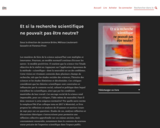
Short Description:
Les manières de faire de la science aujourd’hui sont multiples et innovantes. Pourtant, un modèle normatif continue d’écraser les autres : le modèle positiviste. Il soutient que la science vise l’étude objective de la réalité en s’appuyant sur l’application rigoureuse de la méthode « scientifique » dont la neutralité est un des emblèmes. Cette vision est vivement contestée dans plusieurs champs de recherche, tels que les études sociales des sciences, l’histoire des sciences et les études féministes et décoloniales. Ces critiques considèrent que les théories scientifiques sont construites et influencées par le contexte social, culturel et politique dans lequel travaillent les scientifiques, ainsi que par les conditions matérielles de leur travail. Cet ancrage social de la science rend impensable, pour ces critiques, l’idée même de neutralité. Faut-il donc renoncer à cette exigence normative? Par quelle autre norme la remplacer?Né d’un colloque tenu en 2017 à Montréal, ce livre propose les réflexions et analyses de 25 auteurs et autrices issues de sept pays sur ces questions. Études de cas, analyses réflexives et discussions théoriques s’entrecroisent pour permettre une réflexion collective approfondie sur ces enjeux anciens, mais constamment renouvelés, notamment dans le contexte du nouveau statut précaire de l’expertise scientifique dans l’espace public.
Long Description:
Les manières de faire de la science aujourd’hui sont multiples et innovantes. Pourtant, un modèle normatif continue d’écraser les autres : le modèle positiviste. Il soutient que la science vise l’étude objective de la réalité en s’appuyant sur l’application rigoureuse de la méthode « scientifique » dont la neutralité est un des emblèmes. Cette vision est vivement contestée dans plusieurs champs de recherche, tels que les études sociales des sciences, l’histoire des sciences et les études féministes et décoloniales. Ces critiques considèrent que les théories scientifiques sont construites et influencées par le contexte social, culturel et politique dans lequel travaillent les scientifiques, ainsi que par les conditions matérielles de leur travail. Cet ancrage social de la science rend impensable, pour ces critiques, l’idée même de neutralité. Faut-il donc renoncer à cette exigence normative? Par quelle autre norme la remplacer?
Né d’un colloque tenu en 2017 à Montréal, ce livre propose les réflexions et analyses de 25 auteurs et autrices issues de sept pays sur ces questions. Études de cas, analyses réflexives et discussions théoriques s’entrecroisent pour permettre une réflexion collective approfondie sur ces enjeux anciens, mais constamment renouvelés, notamment dans le contexte du nouveau statut précaire de l’expertise scientifique dans l’espace public.
Word Count: 189292
ISBN: 978-2-924661-54-3
(Note: This resource's metadata has been created automatically by reformatting and/or combining the information that the author initially provided as part of a bulk import process.)
- Subject:
- Applied Science
- Arts and Humanities
- Business and Communication
- Finance
- Health, Medicine and Nursing
- History
- Mathematics
- Philosophy
- Political Science
- Social Science
- Material Type:
- Textbook
- Provider:
- Éditions science et bien commun
- Author:
- Mélissa Lieutenant-Gosselin et Florence Piron
- Sous la direction de Laurence Brière
- Date Added:
- 12/31/2018
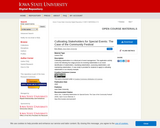
Cultivating stakeholders is a critical part of event management. This application activity covers the following four-stage process for involving stakeholders in an event: identification of stakeholders, classifying stakeholders, assessing stakeholders, and maintaining stakeholders. A case study is provided for students to apply to cultivating stakeholders in an industry example.
- Subject:
- Business and Communication
- Communication
- Finance
- Management
- Marketing
- Material Type:
- Activity/Lab
- Case Study
- Homework/Assignment
- Lesson
- Lesson Plan
- Provider:
- Iowa State University
- Author:
- Eric Olson
- Date Added:
- 03/17/2020
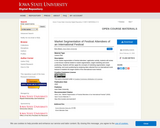
In the market segmentation of festival attendees’ application activity, students will review a mini-lecture material related to market segmentation, target marketing, and event positioning. Students will then apply the concepts of marketing segmentation, target marketing, and event positioning by analyzing data collected from an international music festival to establish the target market of the international music festival.
- Subject:
- Business and Communication
- Communication
- Finance
- Management
- Marketing
- Material Type:
- Activity/Lab
- Case Study
- Homework/Assignment
- Lesson
- Lesson Plan
- Provider:
- Iowa State University
- Author:
- Eric Olson
- Olson Eric
- Date Added:
- 03/17/2020
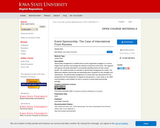
Sponsorship management is activities that an event organization engages in to secure support from sponsors and manage the interests of sponsors at the event. The organizer and sponsor are jointly interested in successfully operating events for their mutual benefit. This section provides an overview of sponsorship management for events. The differences between sponsorship and advertising were compared for their strengths and weaknesses. The sponsorship management of a social event was discussed from the prospective from the perspective of organizers and sponsors. A case study on an LGBT+ event provided a case problem for how to construct a social media sponsorship package.
- Subject:
- Business and Communication
- Finance
- Management
- Marketing
- Public Relations
- Material Type:
- Activity/Lab
- Case Study
- Homework/Assignment
- Lesson
- Lesson Plan
- Provider:
- Iowa State University
- Author:
- Eric Olson
- Heeyle Park
- Olson Eric
- Park Heeyle
- Date Added:
- 03/17/2020
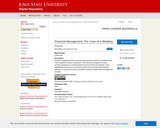
Financial management helps an event planning operation to achieve a profitable future in the competitive business environment. Astute financial management involves securing, allocating and controlling financial resources held by the operation. Good budgeting practices ensure a successful outcome of an event that meets financial objectives. A real-life case study is provided for students to apply financial management principles.
- Subject:
- Business and Communication
- Finance
- Management
- Material Type:
- Activity/Lab
- Case Study
- Homework/Assignment
- Lesson
- Lesson Plan
- Provider:
- Iowa State University
- Author:
- Eric Olson
- Heeyle Park
- Olson Eric
- Park Heeyle
- Date Added:
- 03/17/2020

The March 2022 issue of Page One Economics covers the topics of income and wealth through the lens of racial inequality. Learn the difference between income and wealth, how the racial wealth gap has endured over time, and the reasons that certain groups have been limited in their wealth-building potential.
- Subject:
- Business and Communication
- Economics
- Finance
- Social Science
- Material Type:
- Lesson
- Reading
- Provider:
- Federal Reserve Bank of St. Louis
- Provider Set:
- Page One Economics
- Author:
- Ana Hernández Kent
- Claire James
- David F. Perkis
- Nikki Lanier
- Date Added:
- 03/01/2022
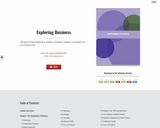
The author's goals in writing Exploring Business were simple: (1) introduce students to business in an exciting way and (2) provide faculty with a fully developed teaching package that allows them to do the former. Toward those ends, the following features are included in this text:1- Integrated (Optional) Nike Case Study: A Nike case study is available for instructors who wish to introduce students to business using an exciting and integrated case. Through an in-depth study of a real company, students learn about the functional areas of business and how these areas fit together. Studying a dynamic organization on a real-time basis allows students to discover the challenges that it faces, and exposes them to critical issues affecting the business, such as globalization, ethics and social responsibility, product innovation, diversity, supply chain management, and e-business.2- A Progressive (Optional) Business Plan: Having students develop a business plan in the course introduces students to the excitement and challenges of starting a business and helps them discover how the functional areas of business interact. This textbook package includes an optionalintegrated business plan project modeled after one refined by the author and her teaching team over the past ten years.3- AACSB Emphasis: The text provides end-of-chapter questions, problems, and cases that ask students to do more than regurgitate information. Most require students to gather information, assess a situation, think about it critically, and reach a conclusion. Each chapter presents ten Questions and Problems as well as five cases on areas of skill and knowledge endorsed by AACSB: Learning on the Web, Career Opportunities, The Ethics Angle, Team-Building Skills, and The Global View. More than 70% of end-of-chapter items help students build skills in areas designated as critical by AACSB, including analytical skills, ethical awareness and reasoning abilities, multicultural understanding and globalization, use of information technology, and communications and team oriented skills. Each AACSB inspired exercise is identified by an AACSB tag and a note indicating the relevant skill area.4- Author-Written Instructor Manual (IM): For the past eleven years, Karen Collins has been developing, coordinating and teaching (to over 3,500 students) an Introduction to Business course. Sections of the course have been taught by a mix of permanent faculty, graduate students, and adjuncts.
- Subject:
- Business and Communication
- Finance
- Management
- Material Type:
- Case Study
- Textbook
- Provider:
- University of Minnesota
- Provider Set:
- University of Minnesota Libraries Publishing
- Author:
- Karen Collins
- Date Added:
- 01/01/2012
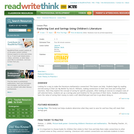
Students make sense of dollars and cents when they study the importance of saving and budgeting in this lesson.
- Subject:
- Arts and Humanities
- Business and Communication
- Finance
- Literature
- Material Type:
- Activity/Lab
- Lesson Plan
- Provider:
- ReadWriteThink
- Provider Set:
- ReadWriteThink
- Date Added:
- 10/02/2013
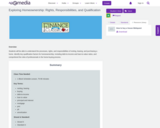
Students will be able to understand the processes, rights, and responsibilities of renting, leasing, and purchasing a home. Identify key qualification factors for homeownership, including debt-to-income and loan-to-value ratios, and comprehend the roles of professionals in the home-buying process.
Class Time Needed:
1 Block Schedule Lesson, 75-90 minutes
- Subject:
- Business and Communication
- Finance
- Material Type:
- Lesson Plan
- Author:
- Sam Sotor
- Date Added:
- 06/04/2024
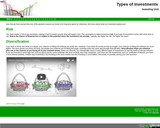
This lesson will teach you the difference between different investments, what they are and the risk involved with each.
- Subject:
- Business and Communication
- Finance
- Material Type:
- Lecture Notes
- Author:
- Lexi Shafer
- Date Added:
- 03/21/2018
